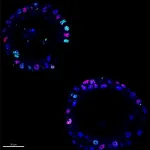(Press-News.org) Today, Breakthrough Discoveries for thriving with Bipolar Disorder (BD²) announced four new national institutions to receive $2.3 million each to join the BD² Integrated Network, a collaborative research and clinical care model that will improve care, interventions, and outcomes for people living with bipolar disorder.
University of Cincinnati/Lindner Center of HOPE, University of California San Diego, The University of Texas at Austin, and The Feinstein Institutes for Medical Research join the six inaugural institutions in the network. Working in partnership with clinicians, researchers, and people living with bipolar disorder, the BD² Integrated Network was established to expand knowledge of bipolar disorder while accelerating the translation of that knowledge into clinical care. An international site will be announced in the coming weeks.
“These new sites significantly expand the BD² Integrated Network and propel our collaborative model forward. This is an important step toward realizing our mission to shorten the time it takes for research to improve treatment for those living with bipolar disorder and making our network more accessible to people across the country,” said Cara Altimus, PhD, managing director for BD² and managing director at the Milken Institute.
The BD² Integrated Network is a groundbreaking, two-pronged approach connecting bipolar disorder research and care. It combines a traditional longitudinal cohort study of 4,000 participants and a learning health network to iteratively improve outcomes for people with bipolar disorder. Clinical sites have accelerated recruitment, with more than 500 individuals already participating in the study.
These four institutions expand the BD² Integrated Network to 10 sites alongside the six inaugural sites: Brigham and Women’s Hospital-McLean Hospital, University of California Los Angeles, Johns Hopkins University, Mayo Clinic, University of Michigan, and UTHealth Houston.
“This eagerly anticipated expansion will bring new clinicians, scientists, and participants into the network and strengthen our ability to accelerate discovery of the behavioral and biological drivers of disease in people living with bipolar disorder while advancing treatment,” said Katherine Burdick, PhD, Vice Chair for Research, Department of Psychiatry, Brigham and Women’s Hospital, Professor of Psychology in Psychiatry at Harvard Medical School, and BD² Integrated Network scientific director.
Bipolar disorder is a highly complex and heterogeneous disorder, and more than 70% of people with bipolar disorder are misdiagnosed at least once. It takes seven years on average to diagnose bipolar disorder, and less than 50% of those who are diagnosed find an effective treatment. The BD² Integrated Network will propel clinical improvement in bipolar disorder treatment and diagnosis through the combined efforts of deep phenotyping, consensus guideline adherence and development, and integration of research and care across sites.
“This unique network model is changing the way we conduct research and measure outcomes for bipolar disorder. Our new sites will contribute to an unprecedented research and clinical care ecosystem that drives innovation for interventions and improved treatments to improve the lives of all those living with bipolar disorder,” said Mark Frye, MD, BD² Integrated Network scientific director and Stephen & Shelley Jackson Family Professor of Individualized Medicine, Mayo Clinic.
Learn more about the BD² Integrated Network at https://www.bipolardiscoveries.org/our-work/integrated-network/
###
About BD²: Breakthrough Discoveries for thriving with Bipolar Disorder is the first organization focused on funding and advancing research and care for bipolar disorder on a global scale. Our collaborative, open-science approach is designed to transform and shorten the time it takes for scientific breakthroughs to make a meaningful difference in the lives of the tens of millions of people with bipolar disorder. For more information, please visit bipolardiscoveries.org.
END
BD² announces four new sites to join landmark bipolar disorder research and clinical care network
University of Cincinnati/Lindner Center of HOPE, University of California San Diego, The University of Texas at Austin, and The Feinstein Institutes for Medical Research expand the groundbreaking network to 10 sites with awards totaling $9.2M.
2025-03-12
ELSE PRESS RELEASES FROM THIS DATE:
Digital Exclusion Increases Risk of Depression Among Older Adults Across 24 Countries
2025-03-12
Older adults who lack internet access are at a significantly higher risk of developing depressive symptoms, especially those with limited familial support or lower income levels, according to a new study published in Health Data Science. Conducted by an international team of researchers, this study analyzed data from five major aging cohort studies covering 24 countries, revealing a strong link between digital exclusion and mental health.
The researchers, led by Dr. Yinzi Jin from Peking University, investigated how digital exclusion—defined as the lack of internet access—affects the mental health of older adults. Using data from the Health and Retirement Study (HRS), ...
Quantum annealing processors achieve computational advantage in simulating problems on quantum entanglement
2025-03-12
Quantum annealing processors outperform classical supercomputers in solving real-world scientific simulations of quantum spin dynamics, researchers report in a new study, achieving results far beyond the capacity of conventional computational methods, which may require impossible time and energy to match. The results provide a challenge to classical computing, where method improvement has in the past tempered claims of quantum advantage. Only in recent years have quantum computers begun to live up to their lofty promises, with quantum processing units (QPUs) with diverse architectures – such as photonic, neutral-atom, and ...
How UV radiation triggers a cellular rescue mission
2025-03-12
How UV Radiation Triggers a Cellular Rescue Mission
Ultraviolet (UV) radiation from the sun is a well-known cause of DNA damage, which can lead to diseases like skin cancer. But how do our cells repair this damage to protect us? Researchers from Sabanci University, Veysel Oğulcan Kaya and Ogün Adebali, have uncovered a fascinating answer: when DNA is damaged by UV light, our cells reorganize their genetic material in 3D space to prioritize repair, in what might be called a “cellular rescue mission.”
A New Look at DNA Repair
DNA, the blueprint of ...
Hepatic stellate cells control liver function and regeneration
2025-03-12
Until now, doctors knew hepatic stellate cells mainly as drivers of liver fibrosis. The actual functions of this cell type have hardly been studied to date. Researchers from the German Cancer Research Center (DKFZ), the Mannheim Medical Faculty and Columbia University in New York have now published in the journal Nature that hepatic stellate cells control liver metabolism as well as liver regeneration and size. The results of the study could contribute to new therapeutic approaches for liver diseases.
The liver is a central organ for carbohydrate and protein metabolism as well as for the detoxification ...
The secret DNA circles fueling pancreatic cancer’s aggression
2025-03-12
Pancreatic cancer is one of the deadliest cancers worldwide, with a five-year survival rate of 13%. This poor prognosis stems from both late detection and the cancer’s notorious capacity to adapt and resist therapy. Now, a study led by researchers at the University of Verona, University of Glasgow, and the Botton-Champalimaud Pancreatic Cancer Centre uncovers a hidden driver of this adaptability: extrachromosomal DNA (ecDNA).
A New Player in Pancreatic Cancer
The team found that some pancreatic cancer cells gain a major survival edge by carrying copies of critical cancer genes—such as ...
2D metals: Chinese scientists achieve breakthrough in atomic manufacturing
2025-03-12
Since the groundbreaking discovery of graphene in 2004, the dizzying pace of progress in two-dimensional (2D) materials has ushered in a new era of fundamental research and technological innovation. Although nearly 2,000 2D materials have been theoretically predicted and hundreds have been created in laboratory settings, most of these 2D materials are limited to van der Waals (vdW) layered crystals.
Scientists have long been keen to develop atomically thin 2D metals, thereby expanding ...
Cause of post-COVID inflammatory shock in children identified
2025-03-12
MIS-C is a serious inflammatory shock that affects children. It can occur several weeks after a COVID infection and can be life-threatening. Until now, however, the precise cause of the condition was unknown. Researchers at Charité – Universitätsmedizin Berlin and the German Rheumatology Research Center (DRFZ), an institute of the Leibniz Association, have identified that reactivation of a pre-existing, dormant infection with the Epstein-Barr virus triggers an excessive inflammatory response. The researchers have detailed their findings in an article in Nature.* These insights open the door to new treatment methods, potentially not limited to MIS-C.
The majority of children ...
QIA researchers create first Operating System for Quantum Networks
2025-03-12
Delft, The Netherlands: Quantum Internet Alliance (QIA) researchers at TU Delft, QuTech, University of Innsbruck, INRIA and CNRS recently announced the creation of the first operating system designed for quantum networks: QNodeOS. The research, published in Nature, marks a major step forward in transforming quantum networking from a theoretical concept to a practical technology that could revolutionize the future of the internet.
“The goal of our research is to bring quantum network technology to all. With QNodeOS we're taking a big step forward. We're making it possible – ...
How the brain uses ‘building blocks’ to navigate social interactions
2025-03-12
Our brains use basic ‘building blocks’ of information to keep track of how people interact, enabling us to navigate complex social interactions, finds a new study led by University College London (UCL) researchers.
For the study, published in Nature, the researchers scanned the brains of participants who were playing a simple game involving a teammate and two opponents, to see how their brains were able to keep track of information about the group of players.
The scientists found that rather ...
Want to preserve biodiversity? Go big, U-M researchers say
2025-03-12
ANN ARBOR—Large, undisturbed forests are better for harboring biodiversity than fragmented landscapes, according to University of Michigan research.
Ecologists agree that habitat loss and the fragmentation of forests reduces biodiversity in the remaining fragments. But ecologists don't agree whether it's better to focus on preserving many smaller, fragmented tracts of land or larger, continuous landscapes. The study, published in Nature and led by U-M ecologist Thiago Gonçalves-Souza, comes to a conclusion on the decades-long debate.
"Fragmentation is bad," said study author Nate Sanders, U-M professor of ecology and evolutionary biology. ...
LAST 30 PRESS RELEASES:
ASU researchers to lead AAAS panel on water insecurity in the United States
ASU professor Anne Stone to present at AAAS Conference in Phoenix on ancient origins of modern disease
Proposals for exploring viruses and skin as the next experimental quantum frontiers share US$30,000 science award
ASU researchers showcase scalable tech solutions for older adults living alone with cognitive decline at AAAS 2026
Scientists identify smooth regional trends in fruit fly survival strategies
Antipathy toward snakes? Your parents likely talked you into that at an early age
Sylvester Cancer Tip Sheet for Feb. 2026
Online exposure to medical misinformation concentrated among older adults
Telehealth improves access to genetic services for adult survivors of childhood cancers
Outdated mortality benchmarks risk missing early signs of famine and delay recognizing mass starvation
Newly discovered bacterium converts carbon dioxide into chemicals using electricity
Flipping and reversing mini-proteins could improve disease treatment
Scientists reveal major hidden source of atmospheric nitrogen pollution in fragile lake basin
Biochar emerges as a powerful tool for soil carbon neutrality and climate mitigation
Tiny cell messengers show big promise for safer protein and gene delivery
AMS releases statement regarding the decision to rescind EPA’s 2009 Endangerment Finding
Parents’ alcohol and drug use influences their children’s consumption, research shows
Modular assembly of chiral nitrogen-bridged rings achieved by palladium-catalyzed diastereoselective and enantioselective cascade cyclization reactions
Promoting civic engagement
AMS Science Preview: Hurricane slowdown, school snow days
Deforestation in the Amazon raises the surface temperature by 3 °C during the dry season
Model more accurately maps the impact of frost on corn crops
How did humans develop sharp vision? Lab-grown retinas show likely answer
Sour grapes? Taste, experience of sour foods depends on individual consumer
At AAAS, professor Krystal Tsosie argues the future of science must be Indigenous-led
From the lab to the living room: Decoding Parkinson’s patients movements in the real world
Research advances in porous materials, as highlighted in the 2025 Nobel Prize in Chemistry
Sally C. Morton, executive vice president of ASU Knowledge Enterprise, presents a bold and practical framework for moving research from discovery to real-world impact
Biochemical parameters in patients with diabetic nephropathy versus individuals with diabetes alone, non-diabetic nephropathy, and healthy controls
Muscular strength and mortality in women ages 63 to 99
[Press-News.org] BD² announces four new sites to join landmark bipolar disorder research and clinical care networkUniversity of Cincinnati/Lindner Center of HOPE, University of California San Diego, The University of Texas at Austin, and The Feinstein Institutes for Medical Research expand the groundbreaking network to 10 sites with awards totaling $9.2M.



